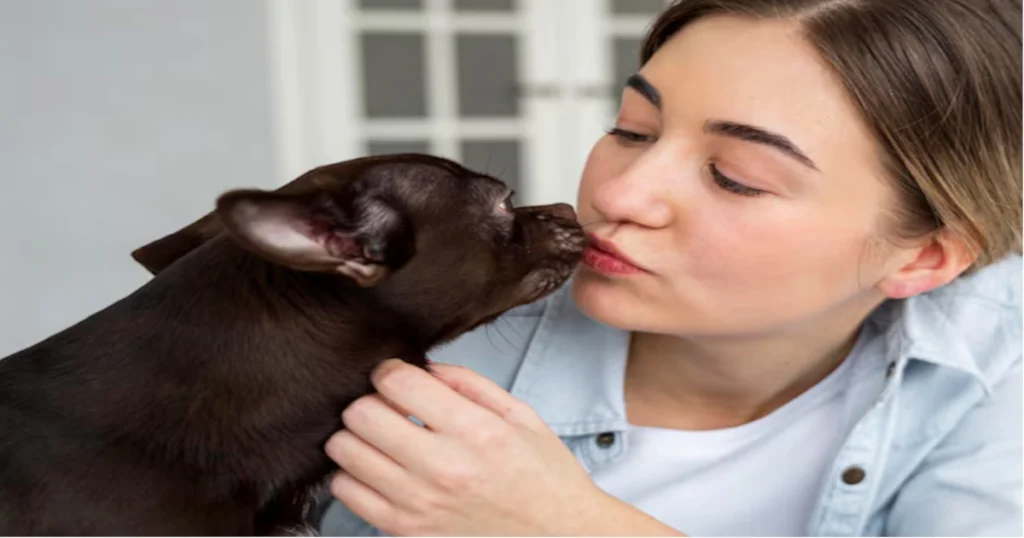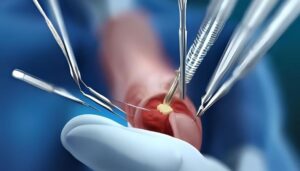Why Do Dogs Lick You? Understanding the Behavior
Dogs are known for their affectionate behavior, and one of the most common ways they show their love and attachment is by licking. Whether it’s a gentle lick on your hand or a persistent series of licks all over your face, dog licking is something every dog owner has likely experienced. But have you ever wondered why your dog licks you? What does this behavior mean? And how should you respond to it? In this article, we’ll explore the different reasons why dogs lick their humans, the science behind the behavior, and how to interpret your dog’s licks.
1. A Sign of Affection and Bonding
One of the most common reasons why dogs lick you is to show affection. Dogs, like many animals, have developed ways to communicate their feelings and emotions, and licking is a natural behavior that helps strengthen the bond between them and their human companions.
The Social Nature of Dogs
Dogs are highly social animals, and licking is one way they interact with others in their pack, whether it’s a dog in the wild or their human family members. In the wild, puppies lick their mothers to express their need for care, and adult dogs lick each other to reinforce social bonds. When your dog licks you, it’s often a way for them to express love, trust, and loyalty.
Positive Reinforcement and Comfort
For puppies, licking is comforting. It’s often associated with their mother’s care and nurturing. As dogs grow older, they carry this comforting behavior into adulthood, using it as a way to express comfort and reassurance. If your dog licks you when you’re feeling stressed or anxious, they may be trying to provide comfort or even mirror your own emotional state. The act of licking releases endorphins, which can help both the dog and the human feel more relaxed and connected.
2. Seeking Attention
Dogs quickly learn that licking is a surefire way to get your attention. Whether it’s to greet you when you come home or to ask for a treat, your dog may use licking as a form of communication to request something from you. If you respond by petting them, giving them a treat, or even just talking to them, your dog begins to associate licking with receiving positive attention. This reinforces the behavior, making it more likely that they’ll continue to lick you in the future.
Dogs and Positive Reinforcement
Dogs are incredibly perceptive when it comes to associating actions with rewards. If licking you results in a favorable outcome, like a belly rub or a tasty snack, your dog may use licking as a tool to get what they want. This behavior is similar to how dogs learn other tricks or commands — through positive reinforcement.
3. Exploring Their Environment
For dogs, their sense of taste and smell is extremely important for exploring the world around them. Dogs use their mouths to gather information, much like humans use their hands. Licking is part of this exploratory behavior, allowing dogs to learn more about the environment, including the people they live with. When your dog licks you, they might be sampling your scent, gathering information about you, or simply trying to understand their surroundings better.
Scent and Taste
Dogs have an extraordinary sense of smell, which they use to gather information about everything they encounter. When a dog licks you, they could be picking up on your scent or the flavors left on your skin. This behavior is particularly common after you’ve been eating or working outside, as your dog may find the scent of food or sweat intriguing.
4. Stress and Anxiety Relief
Dogs, like humans, can experience stress or anxiety. One way they cope with their emotions is by licking. This behavior may serve as a self-soothing mechanism when your dog is feeling uneasy, nervous, or overstimulated. If your dog licks you excessively, it might be their way of relieving anxiety or trying to calm themselves down.
Dogs and Anxiety
Anxiety in dogs can be triggered by many factors, such as loud noises, separation from their owners, or changes in their environment. Some dogs may lick when they’re feeling nervous or when they need reassurance from their human companion. If your dog licks you more than usual, it may be worth considering if there are any stressors in their environment that are contributing to this behavior.
5. Tasting Something on Your Skin
Sometimes, dogs lick simply because they taste something interesting on your skin. This could be food residue, sweat, or even salty skin after a workout. Dogs are naturally drawn to flavors and scents, and if you’ve been eating or have a particularly interesting scent on your skin, your dog may lick you to get a better taste.
Salty Skin
One common reason why dogs lick people is the taste of salt. Our skin naturally secretes salt through sweat, and dogs are often drawn to it. If you’ve been outside in the heat or after exercising, your dog may lick your skin for the salty taste, which is both satisfying and refreshing for them.
6. Inherited Instincts from Puppies
For puppies, licking is a way to communicate with their mothers. It’s a way for them to signal their needs and receive care. As puppies grow, this licking behavior continues into adulthood as a form of communication. Even adult dogs who are no longer puppies may continue to lick their human family members as a sign of affection or respect, much like they would with another dog.
Licking as a Behavior Passed Down
The licking behavior is inherited from their canine ancestors, where it served a practical purpose in the wild. In packs of wolves or other wild dogs, licking was used for grooming, feeding, and communication. Even domestic dogs retain this instinctual behavior, using it to form bonds and convey messages to their human families.
7. Health Reasons: Is Excessive Licking a Concern?
While licking can be a normal behavior, there are times when excessive licking may signal a health issue. Dogs who lick excessively or focus on licking certain areas of their body might be dealing with an underlying condition. It’s important for dog owners to observe their dog’s licking behavior to ensure it’s not a sign of distress or illness.
Allergies or Skin Irritations
Dogs may lick certain areas of their bodies if they are experiencing allergies or skin irritations. This could be due to environmental factors, such as pollen or dust mites, or from food allergies. If your dog is licking a specific area, especially their paws or belly, and seems to be doing so compulsively, it may be time to visit the vet.
Medical Conditions
Excessive licking can also be a sign of medical conditions, including pain, anxiety, or gastrointestinal issues. If your dog is licking more than usual and is also showing signs of discomfort, such as loss of appetite or changes in behavior, it’s essential to consult a veterinarian. They can help diagnose any potential medical issues and provide the proper treatment.
8. How to Respond to Your Dog’s Licking
While dog licking is usually a sign of affection, it’s important for owners to know how to handle the behavior, especially if it’s becoming excessive or problematic.
Setting Boundaries
If your dog’s licking becomes overwhelming, it’s okay to set boundaries. Gently redirect their attention to a toy or ask them to sit before rewarding them with attention or affection. Consistency is key when teaching your dog what behaviors are acceptable.
Positive Reinforcement
When your dog licks you appropriately, reward them with affection or treats. This will reinforce the positive behavior and encourage them to continue to express their affection in a way that’s manageable for you.
Medical Attention
If you suspect your dog’s licking is related to health issues, don’t hesitate to consult with a veterinarian. They can help determine whether there’s an underlying medical condition that needs to be addressed.
9. Conclusion: The Many Reasons Dogs Lick You
Licking is a complex and multifaceted behavior for dogs. Whether it’s a sign of affection, a way to relieve anxiety, or simply a method of exploring their environment, understanding why dogs lick is key to interpreting their emotions and strengthening the bond between you and your pet.
As a dog owner, it’s important to observe your dog’s behavior and respond appropriately. While licking is usually a sign of love and affection, it can also signal stress, anxiety, or even health concerns. By paying attention to your dog’s licking patterns, you can ensure that both you and your dog enjoy a happy, healthy relationship. So, the next time your dog licks you, remember that it’s more than just a gesture — it’s a form of communication, a way for your dog to express love, and sometimes, a sign that they need a little extra care.
Frequently Asked Questions ( FAQs)
Why do dogs lick their owners?
Dogs lick their owners as a form of communication. It can be a sign of affection, trust, and bonding. Licking also serves as a way for dogs to explore their environment and gather information through scent. It’s their natural instinct to show love, seek attention, and sometimes even to relieve stress. While this behavior is usually harmless, it’s important to understand the context in which your dog licks you to determine whether it’s a sign of affection or a response to anxiety or other issues.
Is it normal for my dog to lick me constantly?
Constant licking may indicate that your dog is seeking attention or affection. However, it could also be a sign of anxiety, stress, or a need for reassurance. If your dog is licking you excessively and seems anxious, it might be a good idea to observe their behavior in other situations or consult a veterinarian to rule out underlying health concerns. Most dogs naturally lick to show affection, but if it becomes a habit, setting boundaries can help manage the behavior.
How can I stop my dog from licking too much?
If your dog’s licking becomes excessive, try to redirect their behavior with positive reinforcement. Offer them a toy or ask them to perform a trick before rewarding them with attention. Consistent training can help set boundaries. If the licking seems to be linked to stress or anxiety, consider providing more mental stimulation or comfort. In some cases, excessive licking may be linked to health issues, so a visit to the vet is recommended if the behavior persists.
Why does my dog lick my face and hands?
When dogs lick your face or hands, it’s often a sign of affection and bonding. Dogs lick as a way to show love and respect to their owners. It can also be a way for them to greet you when you come home or after being apart for a while. Some dogs may also lick your face to gather information about where you’ve been, especially if you’ve been eating or outdoors.
Can dog licking be a sign of health problems?
In some cases, excessive licking may be a sign of health issues, such as allergies, skin irritations, or pain. If your dog is licking certain areas of their body excessively or seems to be licking more than usual, it’s worth observing for other symptoms, such as hair loss, redness, or changes in behavior. If you notice these signs, consulting a veterinarian is recommended to rule out any medical conditions.
Does licking have any benefits for dogs?
Licking can provide several benefits for dogs. It’s a way for them to communicate affection and bond with their human family members. Licking also helps dogs relieve anxiety and stress by releasing endorphins. It’s a natural and soothing behavior that can promote relaxation for both the dog and the owner. Additionally, licking helps dogs clean themselves and is a part of their instinctual grooming behavior.





















